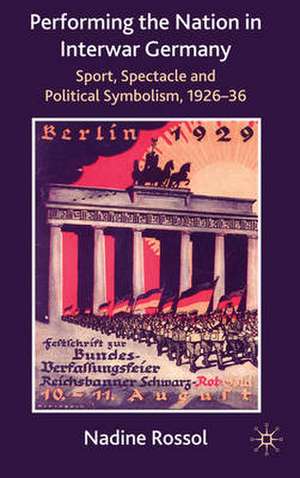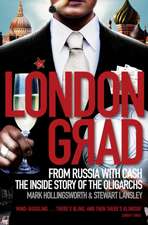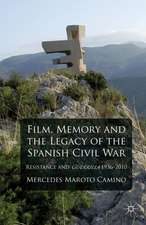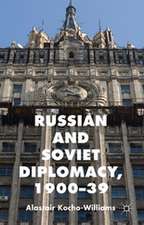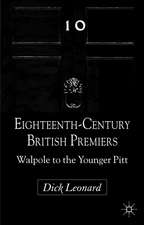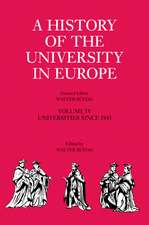Performing the Nation in Interwar Germany: Sport, Spectacle and Political Symbolism, 1926–36
Autor N. Rossolen Limba Engleză Hardback – 3 feb 2010
| Toate formatele și edițiile | Preț | Express |
|---|---|---|
| Paperback (1) | 382.57 lei 6-8 săpt. | |
| Palgrave Macmillan UK – 3 feb 2010 | 382.57 lei 6-8 săpt. | |
| Hardback (1) | 390.63 lei 6-8 săpt. | |
| Palgrave Macmillan UK – 3 feb 2010 | 390.63 lei 6-8 săpt. |
Preț: 390.63 lei
Nou
Puncte Express: 586
Preț estimativ în valută:
74.75€ • 78.25$ • 61.85£
74.75€ • 78.25$ • 61.85£
Carte tipărită la comandă
Livrare economică 05-19 aprilie
Preluare comenzi: 021 569.72.76
Specificații
ISBN-13: 9780230217935
ISBN-10: 0230217931
Pagini: 226
Ilustrații: XIII, 226 p. 16 illus.
Dimensiuni: 140 x 216 x 23 mm
Greutate: 0.48 kg
Ediția:2010
Editura: Palgrave Macmillan UK
Colecția Palgrave Macmillan
Locul publicării:London, United Kingdom
ISBN-10: 0230217931
Pagini: 226
Ilustrații: XIII, 226 p. 16 illus.
Dimensiuni: 140 x 216 x 23 mm
Greutate: 0.48 kg
Ediția:2010
Editura: Palgrave Macmillan UK
Colecția Palgrave Macmillan
Locul publicării:London, United Kingdom
Cuprins
List of Illustrations Acknowledgments Abbreviations Introduction Sports and Games, 1925-28 Staging the Republic: Constitution Day Festivities in 1929 Republican Nationalism: The Rhineland Celebration in 1930 Party Rallies and the Thingspiel in the Third Reich The Death of the Spectacle in the mid-1930s 'Like 100 years ago…'Local Festivities in Weimar and Nazi Germany Conclusion Notes Bibliography Index
Recenzii
'In Performing the Nation, Nadine Rossol highlights continuities in German political representation that transcended the historical divide of 1933, and, in so doing, she challenges the notion that the Nazis invented the mass spectacle...One of the greatest strengths of Rossol's study is its depiction of the gradual evolution in the scale and assertiveness of the Weimar Republic's self-celebration. Rossol's study provides another important example of the continuities that linked the Weimar Republic and the Nazi regime, and she incorporates a great deal of material in this book that will be of value to cultural historians of the period.'
- Erik Jensen, Miami University, USA
- Erik Jensen, Miami University, USA
Notă biografică
NADINE ROSSOL is a Government of Ireland Postdoctoral Fellow in the History Department at the University of Limerick, Ireland, and works on twentieth century German history, in particular cultural and police history. She is currently working on a book studying the role of the police as educator in Germany. She received her doctorate from the University of Limerick in 2006.
